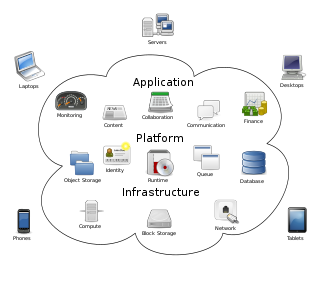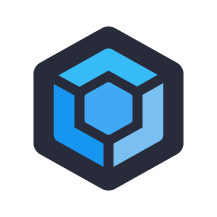An application program is a computer program designed to carry out a specific task other than one relating to the operation of the computer itself, typically to be used by end-users. Word processors, media players, and accounting software are examples. The collective noun "application software" refers to all applications collectively. The other principal classifications of software are system software, relating to the operation of the computer, and utility software ("utilities").
Oracle Enterprise Manager (OEM) is a set of web-based tools aimed at managing software and hardware produced by Oracle Corporation as well as by some non-Oracle entities.

SharePoint is a web-based collaborative platform that integrates natively with Microsoft Office. Launched in 2001, SharePoint is primarily sold as a document management and storage system, but the product is highly configurable and its usage varies substantially among organizations.
Platform as a service (PaaS) or application platform as a service (aPaaS) or platform-based service is a category of cloud computing services that allows customers to provision, instantiate, run, and manage a modular bundle comprising a computing platform and one or more applications, without the complexity of building and maintaining the infrastructure typically associated with developing and launching the application(s), and to allow developers to create, develop, and package such software bundles.

WaveMaker is an enterprise grade Java low code platform for building software applications and platforms. WaveMaker Inc. is headquartered in Mountain View, California. For enterprises, WaveMaker is a low code platform that aims to accelerate their app development and IT modernization efforts. For ISVs, it is a consumable low code component that can sit inside their product and offer customizations.

Cloud computing is the on-demand availability of computer system resources, especially data storage and computing power, without direct active management by the user. Large clouds often have functions distributed over multiple locations, each of which is a data center. Cloud computing relies on sharing of resources to achieve coherence and typically uses a pay-as-you-go model, which can help in reducing capital expenses but may also lead to unexpected operating expenses for users.
Eucalyptus is a paid and open-source computer software for building Amazon Web Services (AWS)-compatible private and hybrid cloud computing environments, originally developed by the company Eucalyptus Systems. Eucalyptus is an acronym for Elastic Utility Computing Architecture for Linking Your Programs To Useful Systems. Eucalyptus enables pooling compute, storage, and network resources that can be dynamically scaled up or down as application workloads change. Mårten Mickos was the CEO of Eucalyptus. In September 2014, Eucalyptus was acquired by Hewlett-Packard and then maintained by DXC Technology. After DXC stopped developing the product in late 2017, AppScale Systems forked the code and started supporting Eucalyptus customers.
Kaavo is a cloud computing management company. Kaavo was founded in November 2007 in the U.S. Kaavo pioneered top-down application-centric management of cloud infrastructure across public, private, and hybrid clouds.
GLPI is an open source IT Asset Management, issue tracking system and service desk system. This software is written in PHP and distributed as open-source software under the GNU General Public License.

OpenStack is a free, open standard cloud computing platform. It is mostly deployed as infrastructure-as-a-service (IaaS) in both public and private clouds where virtual servers and other resources are made available to users. The software platform consists of interrelated components that control diverse, multi-vendor hardware pools of processing, storage, and networking resources throughout a data center. Users manage it either through a web-based dashboard, through command-line tools, or through RESTful web services.

Cloud Foundry is an open source, multi-cloud application platform as a service (PaaS) governed by the Cloud Foundry Foundation, a 501(c)(6) organization.

IBM cloud computing is a set of cloud computing services for business offered by the information technology company IBM. IBM Cloud includes infrastructure as a service (IaaS), software as a service (SaaS) and platform as a service (PaaS) offered through public, private and hybrid cloud delivery models, in addition to the components that make up those clouds.
Greenqloud is a cloud computing software company with headquarters in Reykjavik, Iceland, and office in Seattle, Washington, offering cloud computing software and services. Greenqloud develops and sells the cloud and infrastructure management software Qstack for the global market.
Actian Zen is an ACID-compliant database management system (DBMS) developed by Pervasive Software. It is optimized for embedding in applications and used in several different types of packaged software applications offered by independent software vendors (ISVs) and original equipment manufacturers (OEMs). It is available for software as a service (SaaS) deployment due to a file-based architecture enabling partitioning of data for multitenancy needs.
openQRM is a free and open-source cloud computing management platform for managing heterogeneous data centre infrastructures.

HP Cloud was a set of cloud computing services available from Hewlett-Packard that offered public cloud, private cloud, hybrid cloud, managed private cloud and other cloud services. It was the combination of the previous HP Converged Cloud business unit and HP Cloud Services, an OpenStack-based public cloud. It was marketed to enterprise organizations to combine public cloud services with internal IT resources to create hybrid clouds, or a mix of private and public cloud environments, from around 2011 until 2016.
Docker is a set of platform as a service (PaaS) products that use OS-level virtualization to deliver software in packages called containers. The service has both free and premium tiers. The software that hosts the containers is called Docker Engine. It was first started in 2013 and is developed by Docker, Inc.

Anaconda is a distribution of the Python and R programming languages for scientific computing, that aims to simplify package management and deployment. The distribution includes data-science packages suitable for Windows, Linux, and macOS. It is developed and maintained by Anaconda, Inc., which was founded by Peter Wang and Travis Oliphant in 2012. As an Anaconda, Inc. product, it is also known as Anaconda Distribution or Anaconda Individual Edition, while other products from the company are Anaconda Team Edition and Anaconda Enterprise Edition, both of which are not free.
Kubernetes is an open-source container orchestration system for automating software deployment, scaling, and management. Originally designed by Google, the project is now maintained by the Cloud Native Computing Foundation.

ProGet is a package management system, designed by the Inedo software company. It allows users to host and manage personal or enterprise-wide packages, applications, and components. It was originally designed as a private NuGet manager and symbol and source server. Beginning in 2015, ProGet has expanded support, added enterprise grade features, and is targeted to fit into a DevOps methodology. Enterprises utilize ProGet to “package applications and components” with the aim of ensuring software is built only once, and deployed consistently across environments.









